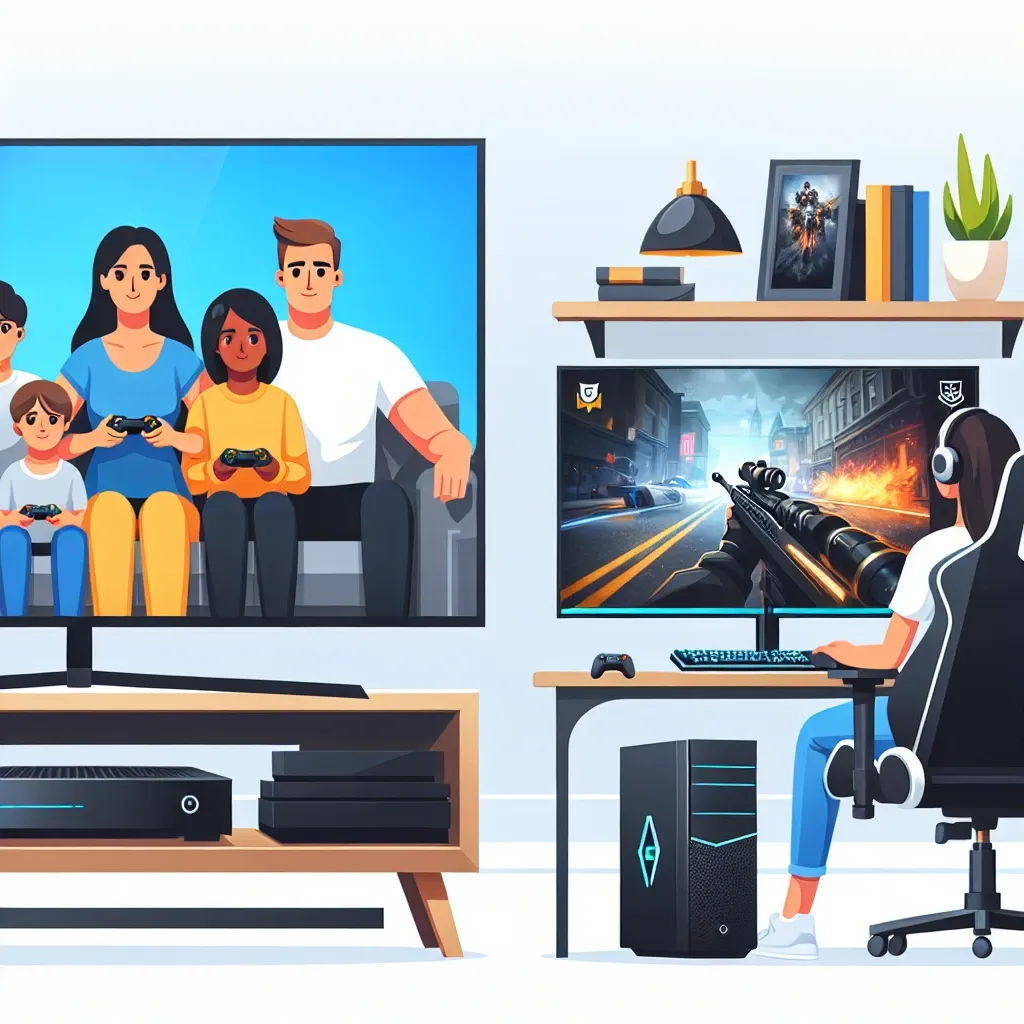In the world of home entertainment, the choice between a Smart TV and a monitor can often be overwhelming. Both devices offer unique features and benefits, making it essential to understand their differences to make the right decision. This article delves into the pros and cons, features, and use cases of Smart TVs and monitors to help you choose the best option for your home entertainment setup.
What is a Smart TV?
A Smart TV is a television set that is designed to connect to the internet and access a wide range of streaming services, apps, and other online content. Unlike traditional TVs, Smart TVs come with built-in web browsers, streaming apps like Netflix, Amazon Prime, and Hulu, and the ability to connect to smart home devices. They are often equipped with advanced features such as voice control, smart assistants, and high-resolution displays, making them a versatile choice for modern entertainment.
What is a Monitor?
A monitor, on the other hand, is a display device that is primarily designed for use with computers. Monitors come in various sizes and resolutions, and they can be connected to a wide range of devices, including gaming consoles, media players, and even smartphones. While monitors do not have built-in smart features, they can be connected to external devices to access streaming services and other content. Monitors are often preferred for their high refresh rates, low input lag, and superior color accuracy, making them ideal for gaming, professional work, and multimedia tasks.
Key Differences: Smart TV vs Monitor
Connectivity and Smart Features
One of the most significant differences between a Smart TV and a monitor is their connectivity and smart features. Smart TVs are designed to be internet-connected devices, offering a wide range of built-in apps and services. They can stream content directly from platforms like Netflix, YouTube, and Amazon Prime, and often come with smart assistants like Google Assistant or Amazon Alexa. Monitors, while not inherently smart, can be connected to external devices like set-top boxes, streaming sticks, and smart speakers to access similar features. However, this requires additional setup and devices.
Display Technology and Performance
When it comes to display technology, both Smart TVs and monitors offer high-quality options, but they cater to different needs. Smart TVs often come with advanced display technologies such as OLED, QLED, and 4K resolution, providing excellent picture quality and color accuracy. They are designed for a more relaxed viewing experience, such as watching movies or TV shows. Monitors, especially those designed for gaming and professional use, often have higher refresh rates (120Hz, 144Hz, or even 240Hz), lower input lag, and better color accuracy. These features are crucial for gaming and content creation, where fast response times and accurate colors are essential.
Form Factor and Design
The form factor and design of Smart TVs and monitors also differ. Smart TVs are typically designed to be the centerpiece of a living room or entertainment area. They often come with sleek, minimalist designs and are built to be mounted on walls or placed on stands. Monitors, on the other hand, are more versatile in terms of placement. They can be easily moved and adjusted to fit different workspaces, making them ideal for use in offices, home offices, and gaming setups. Monitors also come in a variety of sizes, from small 24-inch displays to large 49-inch ultrawide monitors, catering to different needs and preferences.
Price and Value
When it comes to price, both Smart TVs and monitors offer a range of options to suit different budgets. Smart TVs are generally more expensive than monitors, especially when it comes to high-end models with advanced features like OLED or QLED displays. However, the added convenience and features of a Smart TV can justify the higher price for many users. Monitors, especially those designed for general use, can be more affordable, especially if you are looking for a basic display for your computer. However, high-end gaming monitors with advanced features can be quite expensive, often on par with high-end Smart TVs.
Use Cases and Scenarios
Smart TV Use Cases
Smart TVs are ideal for a variety of use cases, particularly for those who prioritize convenience and a seamless streaming experience. They are perfect for:
- Family Entertainment: Smart TVs are great for family gatherings, movie nights, and streaming content together. The built-in apps and easy connectivity make it easy for everyone to access their favorite shows and movies.
- Smart Home Integration: If you have a smart home setup, a Smart TV can serve as a central hub for controlling other smart devices. Many Smart TVs come with built-in smart assistants that can control lights, thermostats, and other devices.
- Streaming Enthusiasts: For those who enjoy streaming content from multiple platforms, a Smart TV is a no-brainer. The built-in apps and easy access to streaming services make it a convenient choice.
Monitor Use Cases
Monitors, on the other hand, are better suited for specific use cases where performance and flexibility are crucial. They are ideal for:
- Gaming: If you are a serious gamer, a high-performance monitor with a high refresh rate and low input lag is essential. Monitors designed for gaming often come with additional features like G-Sync or FreeSync to reduce screen tearing and improve visual quality.
- Professional Work: For professionals who work with graphics, video editing, or other multimedia tasks, a monitor with accurate color reproduction and high resolution is crucial. Many professional monitors come with calibration tools and other features to ensure precise color accuracy.
- General Computing: For everyday computing tasks, a monitor is a practical choice. They are easy to set up, and their flexibility in placement makes them ideal for home offices and workspaces.
Pros and Cons
Pros of Smart TVs
- Convenience: Smart TVs offer a seamless streaming experience with built-in apps and easy connectivity.
- Advanced Features: Many Smart TVs come with advanced features like voice control, smart assistants, and high-resolution displays.
- Smart Home Integration: Smart TVs can serve as a central hub for controlling other smart devices, making them a valuable addition to a smart home setup.
Cons of Smart TVs
- Higher Cost: Smart TVs are generally more expensive than monitors, especially when it comes to high-end models with advanced features.
- Software Updates: Smart TVs can be subject to frequent software updates, which can sometimes introduce bugs or change the user interface.
- Less Flexibility: Smart TVs are often designed to be the centerpiece of a living room, making them less flexible in terms of placement and use.
Pros of Monitors
- Performance: Monitors, especially those designed for gaming and professional use, offer high refresh rates, low input lag, and accurate color reproduction.
- Flexibility: Monitors can be easily moved and adjusted to fit different workspaces, making them ideal for home offices and gaming setups.
- Cost-Effective: Basic monitors can be more affordable, especially if you are looking for a display for general computing tasks.
Cons of Monitors
- No Built-In Smart Features: Monitors do not come with built-in smart features, requiring additional devices for streaming and other online content.
- Setup Complexity: Setting up a monitor to access streaming services and other online content can be more complex, requiring additional devices and cables.
- Less Integration with Smart Home Devices: Monitors are not typically designed to integrate with smart home devices, making them less suitable for a fully connected home.
Conclusion
The choice between a Smart TV and a monitor ultimately depends on your specific needs and preferences. If you prioritize convenience, advanced features, and a seamless streaming experience, a Smart TV is a great choice. On the other hand, if you need high performance, flexibility, and cost-effectiveness, a monitor is the way to go. Consider your use cases, budget, and the overall setup of your home entertainment system to make the best decision. Whether you choose a Smart TV or a monitor, both options can enhance your home entertainment experience in their unique ways.
By understanding the key differences and features of Smart TVs and monitors, you can make an informed decision that meets your needs and enhances your entertainment setup. Whether you are a streaming enthusiast, a serious gamer, or a professional looking for a high-performance display, there is a perfect option out there for you.



